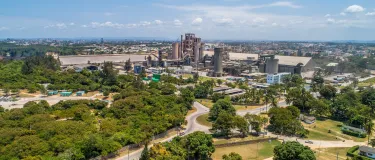Managing its industrial impact on the environment is a deliberate agenda for Bamburi Cement
By Otieno Arowo
By its very nature manufacturing operations involve varied and complex industrial and supply chain processes that require conscious management to regulate their impact on the environment.
From the raw material and their acquisition, to the fuel and the actual technologies running operations, to the supply chain processes of getting raw material and the finished products from point A to B; it is important for manufacturing companies to have sustainability at the centre of their strategy, to ensure all these processes control greenhouse gas emissions.
Indeed as it looks for new, innovative paths throughout its sustainability journey to carry on with conserving the environment, and contributing to Net Zero goals, one of Bamburi Cement’s main target is to continue reducing its carbon footprint from its industrial operations through emission control.
In the cement business, emissions need to be managed throughout the operations, from burning and grinding, to logistics, which involves hauling trucks. Pollutants to be managed in these processes mainly include acid gases and dust which are harmful to the environment, nearby ecosystems, and human health, when in higher concentration.
There are many ways to do that, ranging from energy efficiency, use of alternative fuels and recycling material, use of more efficient technologies and automation, to logistics operations excellence – and Bamburi is taking action in these different fronts as it actively pursues net zero and sustainability targets.
Dust management
This strategy is not just in the industrial operations, even planting trees along roads and across open spaces at our sites is a proactive way to reduce dust in the environment and is done across all Bamburi Operations.
In our industrial operations the company has installed bag filters, which control dust emissions; and continues to do both planned and preventative maintenance to ensure effectiveness.
Investing in automation and modern technologies in our industrial operations also contribute to efficiencies and ensures good practices are sustained.
Alternative fuel
Substitution of fossil fuels with alternative fuels in our Plants is a multi-beneficial agenda that sees Bamburi also contribute significantly in the waste management challenge by disposing of waste safely through the sustainable operation of co-processing. Through its Geocycle brand, Bamburi has partnerships with producers and companies in different sectors, and disposes through controlled incineration of waste ranging from agricultural waste, waste fuel, industrial waste, condemned cargo, to waste tyres among others.
Why invest in emissions management?
Bamburi’s sustainability agenda directs the business to taking concrete actions in preserving the environment for future generations. Investing in emission controls allows the company to keep upgrading its emission management methods, making them more sustainable. As an example, use of electrostatic precipitators (ESP), a filter technology that removes fine particulate matter from flowing process exhaust gases applying the principle of induced electrostatic charge, is being phased out and replaced with bag filters that are more effective and efficient in dust emission abatement, and are not affected by power interruptions. This is the continuous improvement to find more efficient systems, necessitated by its sustainability strategy.
Close cooperation and sharing information with the National Environment Management Authority (NEMA) on its emission control and sustainability agenda actions also reflects on Bamburi Cement’s commitment to this course. Indeed as a green company, Bamburi takes emission control very seriously, and is leading the industry by far on this front. Being part of the Holcim Group, the global leader in sustainable and innovative building materials and solutions, also brings on immense advantages of being able to apply some of the best sustainability practices in the world locally.
For Bamburi it is not about just meeting the environmental management regulations, but having the best sustainability practices across every area of its operations. It is indeed a commitment to keep Building Progress for People and the Planet.
Otieno Arowo is Environment & Energy Optimization Manager at Bamburi Cement.






